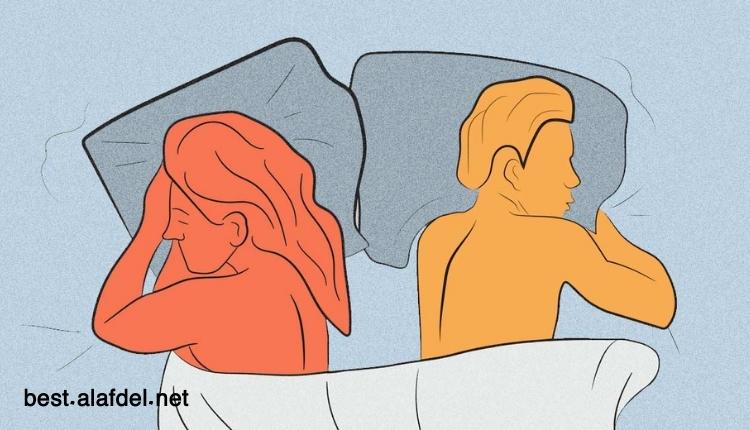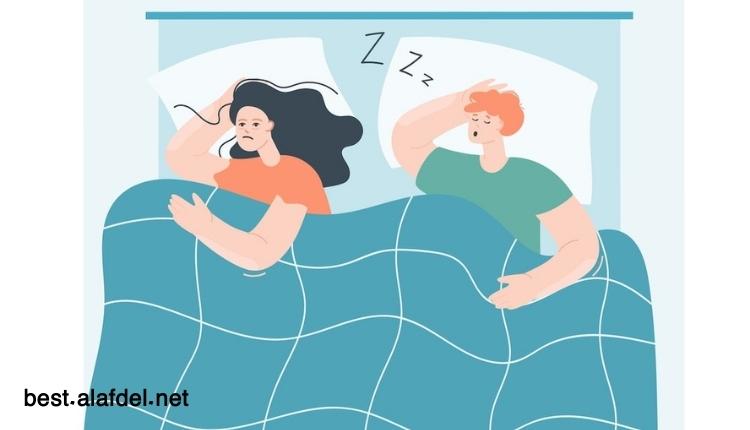Not enjoying sexual intercourse between spouses; Learn about the reasons and treatment
Not enjoying the intimate relationship between the spouses
not enjoying intercourse between spouses; Learn about the 18 most important reasons for the lack of pleasure or lack of it between spouses

Not enjoying the intimate relationship between spouses; in this article, we will discuss the reasons for not enjoying the intimate relationship between spouses, the causes that prevent the husband or wife from experiencing the pleasure and satisfaction they desire, and make them unsatisfied with the intimate relationship with the other party.
This article provides a concise and comprehensive overview of this serious issue that threatens the stability and continuity of the marital relationship, along with suggesting appropriate solutions for each problem individually.
Not enjoying the intimate relationship is a serious issue between spouses
Many husbands and wives complain about not experiencing pleasure during sexual intercourse with their partners and not satisfying their physical needs, which leads to pain and frustration for the complaining party. As the years go by, the need for physical satisfaction increases, intensifying the desire to fulfill this need. Consequently, the pain, sadness, and frustration grow due to the lack of enjoyment with the other partner.
Intercourse is the physical relationship between spouses, where sex is practiced to achieve pleasure and satisfaction and to release sexual desire. It involves various methods, sequential stages, specific words and actions. There are different and diverse reasons that vary from person to person, leading to a lack of enjoyment during intercourse for both parties or one of them. In this article, we address each reason causing the lack of enjoyment and provide effective treatments for each cause. Discover the reasons and treatments in the following paragraphs.
“Read Also: website ideas“
Differences in sexual desire between partners are one of the reasons for not enjoying intercourse

In general, the strength of sexual desire varies from person to person. There are individuals with average desire, others with high desire, some with intense desire, and some with low desire. When there is a partner with low desire and another with average desire, problems arise between them. One partner wants sexual intimacy while the other is not interested. The problems become more pronounced when one partner has high or intense desire while the other has average desire. The partner with low desire engages in intimate relations without genuine desire, merely fulfilling a duty to please the other partner. Consequently, the other partner does not experience the desired pleasure and satisfaction, as there is a lack of connection and the low-desire partner does not engage in intercourse as frequently as desired.
solution here
The solution lies in mutual understanding between the partners. Each partner needs to comprehend the other’s perspective, recognize the importance of sexual intimacy to their partner, and adopt a different outlook on intercourse. The partner with low desire should explore the underlying causes of their low libido and work towards resolving them. They should strive to develop a positive attitude towards sexual intimacy, understand and fulfill the desires of the other partner out of love rather than obligation. With time and effort, the problem will undoubtedly be resolved.
Engaging in masturbation before marriage
When one of the partners (husband/wife) is accustomed to practicing masturbation before marriage, it can be disastrous in every sense. The body becomes accustomed to deriving pleasure from masturbation and adapts to it. When sexual intimacy is experienced after marriage, the body perceives it as unfamiliar and abnormal. As a result, the pleasure derived from sexual intercourse is significantly less compared to the pleasure derived from masturbation.
In this case, the individual compares the pleasure experienced through masturbation with the pleasure experienced in the new situation and may resort to the old habit of masturbation. They may escape to it and engage in sexual intimacy with the partner merely out of obligation, or they may avoid it altogether. Masturbation is not only a factor contributing to the lack of enjoyment in sexual relations, but it also has numerous health and psychological risks. Most importantly, it is considered forbidden and diminishes one’s standing with Allah.
What is the solution here?
The solution is to refrain from engaging in the forbidden act of masturbation. It requires determination, patience, seeking help from Allah, self-discipline, and training the body to derive pleasure from natural sexual intercourse with one’s spouse. This process takes time to change the body’s way of experiencing pleasure. The husband or wife should understand that they can achieve immense pleasure with their partner, far greater than the malicious act of masturbation. It is time to stop engaging in masturbation, as it is destructive to both health and marital relationships, and it brings about the displeasure and anger of the Most Merciful.
“Read Also: Feeding Healthy Your Tiny“
Sexual weakness and the inability to enjoy sexual intercourse

When a husband experiences sexual weaknesses such as erectile dysfunction, premature ejaculation, or low libido, it can result in the wife not being able to enjoy sexual intercourse. This can lead to two scenarios:
- The husband may feel helpless, as the issue of sexual intercourse highlights his inadequacy and failure. He may avoid engaging in sexual activity and make excuses to avoid it altogether.
- If the husband does not avoid sexual intercourse and continues to engage in it, the wife suffers from a lack of pleasure. She engages in sexual activity seeking pleasure and fulfillment, but it is not achieved. Premature ejaculation leaves the wife unsatisfied, and erectile dysfunction can be frustrating for her, as the loss of erection during penetration prevents her from experiencing pleasure.
In such a situation, the wife may resort to masturbation to fulfill her needs, or she may suppress her desires, causing frustration. Both options are unsatisfactory, as masturbation can lead to addiction and the suppression of desires may eventually lead to negative consequences.
The solution to this problem, which is a common issue in sexual relationships, involves the following steps
The wife should communicate to her husband that he is strong, capable, and excellent. The psychological aspect is important for the husband’s confidence and well-being.
The husband should investigate the reasons behind his erectile dysfunction and premature ejaculation. It could be psychological or physical. If it is psychological, therapy and counseling may be beneficial. If it is physical, there are permanent and temporary treatments available to enhance erection and delay ejaculation, which can be obtained from pharmacies or herbalists.
If the husband refuses to seek treatment, the wife can discreetly purchase safe sexual enhancers and incorporate them into his juice or food. When the husband notices a change in his performance, he will be motivated to seek treatment.
“Read Also: Cryptocurrency risks“
Watching pornography and the inability to enjoy sexual intercourse
Watching pornography can lead to significant changes in the intimate relationship between spouses. The husband sees different bodies and compares them to his wife’s body, which instills a belief that his wife’s body is unattractive and inferior compared to what he sees in pornography. He desires what he perceives as more beautiful rather than what he considers as inferior. Additionally, pornography often depicts explicit and artificial sexual acts and forbidden practices, such as anal sex.
The husband becomes aroused by what he sees in pornography and seeks to replicate those acts with his wife. If the wife refuses due to their strangeness or deviation from her comfort zone, it can lead to conflicts between them. Alternatively, the wife may reluctantly engage in these acts to please her husband, which can eventually lead to her developing a dislike for sex, feeling humiliated and demeaned, and perceiving herself as merely a tool to satisfy her husband’s desires.
Furthermore, the lack of enjoyment in the sexual relationship due to pornography consumption can push both parties or one of them towards engaging in illicit sexual relationships outside of marriage in order to pursue the pleasure they witness in pornography. It can also lead to engaging in deviant sexual practices or even addiction to masturbation because the act, combined with watching explicit content, creates a different and distorted sense of pleasure, especially if one of the partners already experiences sexual weakness or low libido. Moreover, pornography can destroy and distort the natural sexual relationship between spouses, leading to the gradual deterioration of the marital bond and a diminished enjoyment of sexual intercourse.
The solution to this problem
The solution to this problem involves the following steps:
- Strengthening one’s faith in God and refraining from watching such obscenities, as watching pornography encompasses numerous grave sins, not just one.
- Convincing oneself of the value and attractiveness of one’s spouse, and avoiding any illicit relationships and cutting off any existing ones.
- Understanding that those who have fallen into this grave sin are dealing with a form of addiction that requires determination, patience, self-discipline, seeking Allah’s assistance, and self-confidence.
“Read Also: startups“
Selfishness as a reason for not enjoying the spouse

When a husband’s only concern is his own satisfaction and he seeks to fulfill his needs and release his desires without considering his wife’s pleasure, it indicates that he is a selfish and ignorant spouse. He disregards his wife’s longing for intimacy and love and transforms the sexual act into uncomfortable moments for her. He has lost the connection and tenderness that his wife deserves. In such cases, the husband focuses solely on his own gratification, considering the sexual encounter complete for himself, even though his wife may still be in the phase of enjoyment and has not reached orgasm yet. This behavior stems from selfishness and narcissism in a husband’s character.
The suggested solution here
The suggested solution here is for the wife to communicate her desire to fulfill her own pleasure as well and ask her husband to continue the sexual activity until she reaches satisfaction and experiences pleasure, just like he did. The wife should not feel ashamed to express her needs, and the husband should understand and acknowledge that his wife has the right to experience pleasure too.
Dealing with stupidity leads to a lack of enjoyment in intercourse
Sometimes, despite both partners being passionate about sex, there may be a lack of enjoyment for one or both of them. This can be attributed to unwise and unintelligent behavior from one or both partners. For example, the husband might only focus on penetration without engaging in foreplay, caressing, or romance. As a result, the wife may experience pain due to rushed and unwise penetration from her husband.
Furthermore, some wives may not reciprocate their husband’s affection, foreplay, or tenderness. From the beginning, they lie on the bed, expecting their husband to do everything, without displaying any affection, excitement, or foreplay. Naturally, this does not please the husband, as he desires emotional and physical connection with his wife, rather than encountering a passive body on the bed.
The solution here
The solution here lies in changing the husband’s perspective on sexual intercourse. He should understand the importance of foreplay and tenderness towards his wife before engaging in penetration. This approach will bring pleasure to both him and his wife. Additionally, the wife should change her behavior and actively participate in the sexual encounter, embracing her husband’s advances and exploring the various aspects of lovemaking together. It is crucial to recognize that unwise behavior from either spouse or indifference from the wife leads to a lack of enjoyment in sexual intercourse and subsequent suffering.
“Read Also: Create a YouTube channel“
Rape, not consensual intimacy, is one of the reasons for not enjoying marital relations
The worst part is when it feels like rape to the wife instead of consensual intimacy. Every time her husband engages in sexual intercourse with her, she feels raped. Some wives hate their husbands for various reasons, making sexual intercourse a difficult time for them. They hate their husband, hate seeing him, hate his voice, hate his smell. How would she feel when he touches her and engages in sexual intercourse? It feels like rape, but it’s not ordinary rape. It’s repeated rape whenever the husband wants to have intercourse.
The solution here is how?
It’s a difficult solution. Either the wife chooses to separate from someone she hates, which causes her emotional and physical pain, or she looks for reasons to overcome her hatred for her husband and tries to start a new page with him. She needs to work on changing his behavior and be patient with the help of God and prayer. She should also change her mindset about sex and try to enjoy it despite her hatred for her husband.
Lack of personal hygiene is one of the reasons for not enjoying the spouse.
Another reason for not enjoying sexual intercourse is the lack of personal hygiene. Taking care of one’s body and cleanliness is important and a concept understood by any rational person. However, unfortunately, some couples neglect this matter and don’t think about it or don’t care about maintaining the cleanliness of their bodies as required.
Imagine one of the partners (either the husband or the wife) longing for the other, longing for sexual intercourse, and then being surprised by a foul odor from the other partner, such as under the armpits, sensitive areas, or overall bad body odor! What do you expect the reaction of the longing partner to be? Undoubtedly, their intimacy and desire will diminish, if not completely vanish, and their concern will shift to ending the intercourse. With repeated occurrences, disgust towards the unclean partner arises, whether it’s disgust towards intimate relations specifically or general aversion towards interacting with them in other aspects of life.
The solution here is simple
It is to pay sufficient attention to personal hygiene, especially in sensitive areas, and to apply perfumes before intercourse. Both partners should shower before engaging in intimate activities, and the wife should learn proper care for her sensitive areas.
Lack of variety in sexual intercourse
By nature, humans enjoy novelty and change. They like variety. When they become bored, they lose interest and passion for something, and this applies to sexual intercourse as well. Engaging in the same sexual activities in the same way every time can lead both partners or one of them to become bored, and over time, their desire and love for intercourse diminish. Additionally, the frequency of sexual activity naturally decreases as boredom kills everything beautiful. The lack of variety in sexual positions, locations, outfits, and decorations undoubtedly leads to a lack of enjoyment in sexual intercourse.
solution here is simple
It is important to change the location of sexual activity outside the bedroom on some occasions, renew the woman’s provocative attire, try new positions, and engage in sexual activity at times that have not been tried before.
Did you know that the most helpful tips for achieving sexual pleasure include: having piety and avoiding prohibited acts, having love and affection between spouses, engaging in physical exercise and pelvic floor exercises, intimate communication between partners, stimulating the clitoris during sex, learning about sexual stimulation and starting with foreplay before penetration, and expressing dissatisfaction with the sexual relationship to the spouse.
Various reasons for not enjoying sexual intercourse
Here are various reasons for not enjoying sexual intercourse between spouses that were not mentioned before:
- Low estrogen levels in women: Decreased estrogen levels in women due to glandular dysfunction can negatively impact sexual pleasure. Treatment may involve medication to stimulate estrogen production in the body.
- Fear of intercourse: One or both partners may experience fear and anxiety about intercourse, either due to early stages of marriage or due to pain experienced by the woman during intercourse. It is important to address these fears, overcome them, and learn to accept and enjoy intercourse. The use of sexual lubricants can help reduce pain if it is a concern.
- Aging-related issues: Menopause, resulting from hormonal changes, can lead to vaginal atrophy and painful intercourse, contributing to a decrease in desire and orgasmic response. This typically occurs during the menopausal stage.
- Painful intercourse due to conditions like vulvodynia (burning pain in the genital area).
- Previous traumatic sexual experiences such as rape or harassment: These experiences can cause a lack of acceptance and fear of intercourse, which needs to be addressed and overcome.
- Feelings of embarrassment towards the partner: Overcoming feelings of shame and breaking down barriers is essential.
- Medications that decrease sexual desire, such as certain blood pressure medications or antidepressants: In such cases, consulting a doctor to find alternative medications that do not negatively affect sexual function is recommended.
- Poor psychological state (e.g., depression and stress): Psychological factors can negatively impact desire and sexual pleasure. It is important to manage stress, anxiety, and any factors that affect mood.
- Arousal disorders in women’s genital area: These can contribute to a lack of sexual pleasure.
- Brain-related issues in women: Certain problems at the brain level can affect sexual enjoyment.
- Surgical procedures in sensitive areas: Surgeries performed in the genital region can negatively impact sexual pleasure.
- Medical conditions that have a negative impact on sexual response (e.g., diabetes): Treating these underlying conditions is important.
- Hypoactive sexual desire disorder (HSDD): A condition characterized by a persistent lack of sexual desire.
- Insufficient foreplay: Lack of adequate foreplay is an important factor that can lead to a lack of pleasure and enjoyment during intercourse.
- Lack of self-confidence: This can result in a decreased desire for sexual intimacy or an inability to connect with the partner, ultimately affecting mutual satisfaction.
Reasons for insensitivity to the male organ inside the vagina
When it comes to the reasons for not feeling the sensation of the penis inside the vagina, there are several factors to consider:
- Insufficient sexual stimulation: Inadequate foreplay or lack of arousal can result in reduced sensation during intercourse.
- Fear and anxiety: Psychological factors such as fear or anxiety can interfere with the ability to fully experience pleasure during sex.
- Relationship issues: Problems within the relationship, such as lack of emotional connection or unresolved conflicts, can impact sexual satisfaction.
- Lack of mutual love: When there is a lack of mutual love and emotional intimacy between partners, it can affect the level of pleasure experienced during intercourse.
- Lack of sexual knowledge: Limited sexual knowledge or understanding of one’s own body and desires can hinder the ability to fully enjoy sexual experiences.
- Aging: As individuals age, hormonal changes and physical factors may contribute to decreased sensitivity and reduced pleasure during intercourse.
- Past painful sexual experiences: Previous traumatic or painful sexual experiences, such as sexual assault or abuse, can create emotional and physical barriers to experiencing pleasure.
- Stress and depression: High levels of stress or depression can negatively impact sexual desire and pleasure.
- Feelings of shame or self-consciousness: Body image issues or feelings of shame about one’s own body can affect the ability to fully enjoy sexual encounters.
- Health conditions: Certain health conditions, such as diabetes, can affect sexual response and sensation.
- Vaginal dryness: Inadequate lubrication, often associated with hormonal changes or certain medications, can contribute to reduced sensation during intercourse.
- Weakened pelvic floor muscles: Weak pelvic floor muscles, resulting from pelvic surgeries or childbirth, can lead to decreased blood flow and reduced sensitivity in the vaginal area.
The treatment for not feeling the sensation of the penis inside the vagina depends on identifying the underlying cause, whether it is psychological or physical. It may involve addressing relationship issues, improving sexual communication, seeking therapy or counseling, using lubricants, exploring different sexual techniques, or addressing any underlying health conditions.
In conclusion, after discussing the reasons for not enjoying sexual intercourse between spouses and mentioning 18 factors that lead to a lack of pleasure or diminished pleasure, which ultimately result in not enjoying the spouse, feeling unhappy, and lacking the desired satisfaction and pleasure, know, dear husband and dear wife, that you have the power to achieve the desired pleasure and satisfaction.
This matter requires a good understanding, abandoning harmful actions, and engaging in dialogue with each other about desires and fulfilling each other’s passions. Understand that every problem has a solution and seeking illicit relationships as an escape from existing problems is not a solution but the beginning of loss and hastening the destruction of the marital relationship.
In short, identify the issues you face during intercourse and start addressing them. Seek help from God and rely on yourself to find solutions. Don’t procrastinate or hesitate to reach out to us if you have any marital problems or issues related to parenting. And if we missed any reason for not enjoying sexual intercourse between spouses, please share it with us in the comments.
